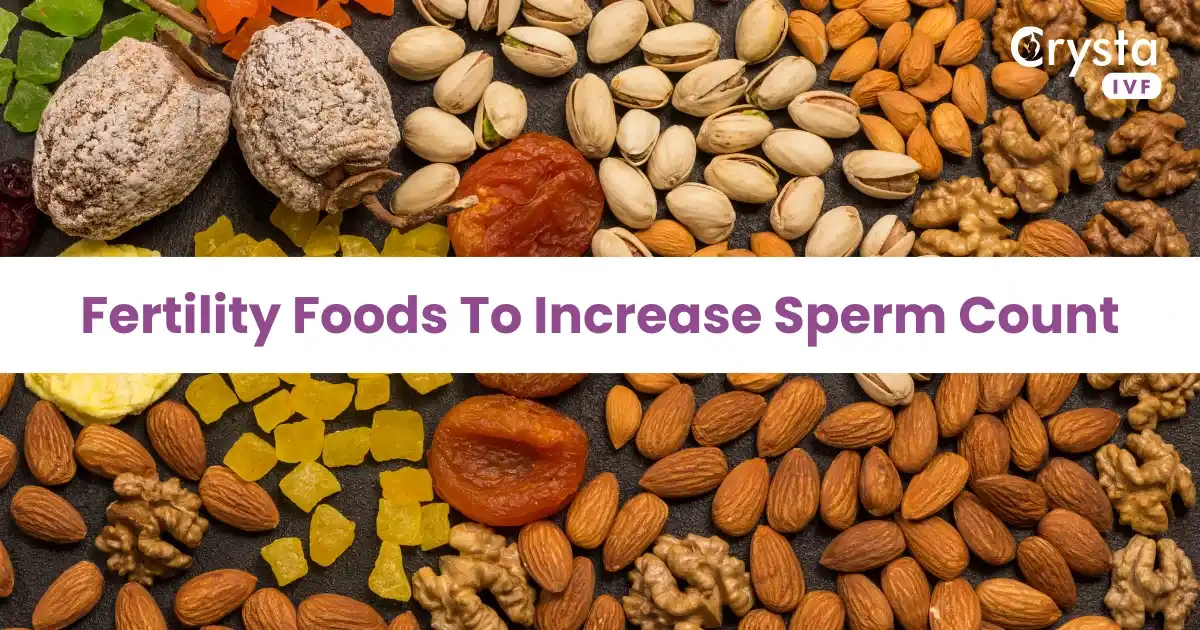A healthy lifestyle is as important for a man as it is for a female partner. Conceiving a child is a joint effort between a man and a woman. While the woman’s fertility is often the focus, a man’s fertility is just as important. Having a high sperm count will boost the chances of a successful conception and having good-quality and high-quantity sperm is important for a healthy and happy pregnancy.
With this in mind, it is important for men to consume foods that increase sperm count and improve their fertility. In this blog, we will be highlighting a list of 10 foods that can help boost sperm count and overall male fertility. By incorporating these foods into your diet, you can take an important step towards bringing a new life into your home.
What is the Role of Sperm in Pregnancy?
According to MedlinePlus, the normal sperm volume ranges from 1.5 to 5.0 millilitres per ejaculation. Around 50-60% of the sperm should have a normal shape and motility. Sperm quality and quantity have a major role to play in a successful conception of a baby.
Note: Low sperm count is one of the prime causes of male infertility. Thus, it is extremely important to detail different methods and know about foods that boosts sperm count and what to include in your diet to increase your chances of conceiving naturally or via fertility treatments.
10 Foods to Eat to Increase Sperm Count
Many studies suggest that nutrition, including lifestyle, plays a major role in creating healthy sperm. The right food plan is key to dealing with various chronic conditions, including fertility health.
The foods you choose to fill your plate can decrease inflammation, lower cholesterol, and enhance digestion. But not just these, the food plays a major role in your reproductive health as well, such as the sperm count, the chances of pregnancy and hormone regulation.
Still, thinking about the best foods to increase sperm count? And how much food is enough? Consider the list of the top healthy foods you can include in your diet for healthy sperm.
Eggs
Eggs top the list of some of the best fertility superfoods to increase male fertility. The reason behind including eggs in your diet is that eggs are loaded with minerals and nutrients, which many modern foods lack. Apart from containing various nutrients, eggs are also rich in the following vitamins:
- Vitamin K
- Vitamin D
- Vitamin B6
- Vitamin E
- Zinc
- Calcium
#Pro Tip: Eggs are good for male fertility because they are highly loaded with protein. The nutrients present in eggs help increase sperm production, thereby positively affecting male fertility.
Bananas
Bananas are an important part of the best foods that are responsible for sperm recovery. Vitamin B6 in bananas helps in boosting the production of the hormone testosterone, which is a prominent male sex hormone and is responsible for improving the libido. Bananas are also known as a food for healthy sperm as they increase the sex drive in men. Apart from increasing sex drive, bananas are also responsible for improving sex performance and overall virility.
#Protip: One or two bananas a day could significantly increase your sperm count. However, it also depends on the lifestyle you follow.
Dark Chocolate
Dark chocolate would be of great help if you are looking for fertility foods to increase sperm count and motility fast. Various research studies show that men can get more benefits from dark chocolate than women, such as improving the quality of their sperm.
#Protip: Dark chocolate is also helpful in enhancing the volume of ejaculate and boosting sperm count and motility. However, it should be moderately consumed to avoid excessive calorie intake.
Spinach
If you are planning to make your parenthood dreams come true and looking for the best Indian food to increase sperm count, consider consuming spinach to boost fertility. Spinach is super-rich in folic acid, which is responsible for decreasing the number of abnormal sperm in the semen, which boosts your chances of having a good amount of sperm penetration into the egg.
#Protip: Spinach is also helpful in preventing cancer and reducing blood pressure, thereby impacting your overall health. Generally, one cup of boiled spinach can give you enough folate to form sperm.
Oysters
Oyster is known as the food to increase sperm motility fast and it also increases libido (which is important if you’re trying to have a baby). Oysters are beneficial for male fertility because this super seafood is also extremely high in zinc. Consuming a zinc-rich diet has been found to boost the hormone testosterone, sperm count, and sperm motility. Oysters are also considered a fertility superfood because they are high in the maintenance of healthy sperm.
#Protip: Oysters must be consumed weekly to increase the formation of sperms. Alternately, if you are allergic to oysters, you can consume other poultry products, seeds and nuts to gain zinc in your diet.
Nuts & Seeds
The selenium found in nuts, mostly Brazilian nuts, can prove to help boost sperm count, improve sperm shape and sperm motility. Nuts are rich in omega-3 fatty acids that help increase sperm count in men and are considered to be the best food for sperm recovery.
#Protip: Consume walnuts, almonds and hazelnuts regularly to observe an increase in your sperm count. These nuts are rich in omega-3 fatty acids, folate, Vitamin E and zinc, which help in sperm motility and morphology.
Pomegranate
Pomegranate juice has been shown to improve sperm quality and motility. The antioxidants in pomegranate juice can help to protect sperm from damage caused by free radicals, which can lead to better sperm health and increased fertility.
#Protip: Regular consumption of pomegranate fruit or fruit juice could increase your sperm count.
Oranges and Strawberries
None of us is unaware of the remarkable benefits of Vitamin C. And when it comes to male fertility, Vitamin C-containing foods like oranges and strawberries are best known for improving the quality and quantity of sperm because it is responsible for protecting sperm from oxidative damage. Consuming fertility-boosting foods like oranges and strawberries is effective for male fertility because it helps to improve sperm motility and overall sperm health in men.
#Protip: As far as now, there is no specific amount of orange consumption that is suggested to increase the sperm count, but incorporating oranges in your diet can overall impact your motility and quality of sperm.
Regular Water Consumption
Drinking at least 8 glasses of water is essential for your overall health, including fertility health. Various research studies say that it is important to stay hydrated to achieve and maintain healthy fertility. It has also been observed that dehydration in many cases can lead to reduced sperm quality and decreased volume of semen.
#Protip: Aim for consuming 8 to 10 glasses of water daily. It not only increases the sperm count but also significantly impacts the quality of sperm.
Whole Grains
Whole grains such as brown rice, quinoa and oats are rich in vitamin E, magnesium and zinc, which are important for sperm health. Vitamin E is an antioxidant that can help to protect sperm from damage caused by free radicals, magnesium is important for sperm motility, and zinc is essential for sperm production. All these nutrients can contribute to better sperm health and increased fertility.
#Protip: Folate, zinc, fibre, and antioxidants found in whole grain foods help in DNA synthesis, sperm production, sperm quality, regulating hormones and overall reproductive health improvement.
5 Foods to Avoid for Increasing Sperm Count
The rapidly decreasing sperm quality is a concerning factor in the present world. The foods you eat and the lifestyle you follow have a major role to play in enhancing sperm count in men. Most studies show that certain foods can severely affect male fertility. If you are trying to have a baby, consider the list of foods that you should not consume to boost sperm count.
Processed meat
Couples trying to conceive should limit their consumption of processed meats, which can affect their fertility health. Some of the processed meats are bacon, beef jerky, hot dogs, and salami. Limiting consumption of these foods can help you improve your chances of conception as it will help you in increasing your chances of sperm production and improve fertility health.
Soy products
Excessive consumption of soy products has been linked to reduced sperm concentration in men and prominent fertility experts advise couples to limit their intake of soy products when they are trying to have a baby.
Trans fats
Trans fats are considered to be responsible for increasing the risk of cardiac-related issues. It is thus recommended by the top fertility experts to avoid consuming trans fats especially when they are trying to conceive because trans fats are linked to reduced male fertility and sperm counts in men.
Excessive Alcohol & Caffeine Intake
Excessive alcohol consumption can decrease sperm count, affect sperm quality and lead to erectile dysfunction. High caffeine intake can also decrease sperm count and affect sperm quality.
High-fat dairy products
Dairy products comprising high fats are linked with abnormal sperm shape and sperm motility. Thus, fertility doctors advise couples to reduce their consumption of high-fat dairy products to increase male fertility.
Why Are Sperm Counts Dropping Around the World?
For some years now, the average count of sperm for a common man has dropped a whopping 50%. Although both partners in procreation are responsible for enhancing their fertility odds, men are typically forgotten when fertility conversations occur.
Even recent studies, as published in the journal Human Reproduction Update, have shown a decline in sperm count, raising concerns about a potential reproductive crisis. These findings have significant implications for human reproduction if the current trend continues.
The study found that sperm concentration dropped from an average of 101.2 million per millilitre to 49.0 million per millilitre between 1973 and 2018 – a decline of 51.6%. This decrease in sperm count is a cause for concern for couples trying to conceive and a significant problem for society and the human race.
Lifestyle Reasons Why Sperm Count is Dropping
Research has shown that a significant decline in sperm count is due to certain factors. Here are some reasons why sperm count is declining:
- Poor Diet: Eating too much junk food and lacking essential nutrients can impact sperm health.
- Stress: Chronic stress affects hormone levels, which can lower sperm production.
- Smoking & Alcohol: Both are known to reduce sperm count and affect sperm quality.
- Obesity: Being overweight can disrupt hormones and reduce fertility in men.
- Exposure to Heat: Frequent use of hot tubs, saunas, or tight underwear can overheat the testicles.
- Environmental Toxins: Pesticides, plastics (like BPA), and pollution can harm sperm production.
- Lack of Exercise: A sedentary lifestyle can negatively impact testosterone and sperm count.
- Excessive Screen Time: Long hours of sitting with laptops on the lap may increase testicular temperature.
Drug Use: Anabolic steroids and recreational drugs can drastically reduce sperm count.

To Sum Up
When trying to conceive, it’s important to remember that a healthy diet and lifestyle can play a huge role in improving sperm health and increasing the chances of a successful pregnancy. Incorporating sperm-increasing foods such as oysters, pomegranates, dark chocolate, nuts and seeds, fruits and vegetables, fish, and whole grains into your diet can help to give your little swimmers a boost.
And don’t forget to avoid foods and habits that can negatively impact sperm health. Remember, a healthy, balanced diet that includes a variety of nutrient-rich foods is key to supporting sperm health.
For more queries and questions related to male infertility, contact us at 893 893 5353 to talk to the best fertility experts who can guide you on every step of your parenthood journey.
Frequently Asked Questions
1. How to make sperm stronger for pregnancy?
To make your sperm stronger, focus on a healthy lifestyle and food. Eat a balanced diet, stay active, avoid smoking and alcohol, reduce stress, drink enough water and get enough sleep. Also, avoid tight underwear and heat exposure to your groin. Strong sperm means better chances of fertilising the egg.
2. What foods produce sperm fast?
Foods rich in zinc, vitamin C, folic acid, and antioxidants help produce sperm faster. Some of the foods include Eggs, Spinach, Walnuts, Citrus fruits, Pumpkin seeds, and Whole grains. However, research shows pumpkin seeds, oysters, and dark chocolate are also known to boost sperm count and quality quickly.
3. Is milk good for sperm?
Yes, milk is good for sperm, but in moderation. Milk provides calcium and vitamin D, which are good for overall health. Prefer low-fat or plant-based milk options, as full-fat dairy in excess may affect sperm quality.
4. How to check sperm count at home?
You can buy a home sperm test kit online or from a pharmacy to check sperm count at home. These kits test your sperm count and motility (movement). However, for accurate results, it’s always better to visit Crysta IVF and get your sperm analysis.
5. Why is my sperm watery?
Watery sperm can be due to low sperm count, frequent ejaculation, poor diet, or hormonal imbalance. It is highly recommended to consult with a fertility expert at Crysta IVF to know the reason behind watery sperm and tips to manage it.
6. What are the signs of weak sperm?
Some signs of weak sperm include:
- Difficulty in getting your partner pregnant
- Watery semen
- Low sperm motility (movement)
- Irregular shape or size of sperm
7. Which dry fruit is best for sperm?
Walnuts and almonds are the best dry fruits for sperm health. They are rich in omega-3 fatty acids and antioxidants, which improve sperm count, motility, and shape.
8. Is pineapple good for sperm?
Yes, pineapple is good for sperm as it contains antioxidants and vitamin C, which are good for improving sperm motility and reducing damage to sperm cells. It also improves semen taste for some.
9. How to increase sperm thickness?
To increase sperm thickness, stay hydrated, eat protein-rich foods like eggs and chicken, include antioxidants (like berries and spinach), and avoid smoking or alcohol. Exercise regularly and limit stress.
10. Does onion increase sperm count?
Yes, onions are great for sperm health. They increase testosterone levels and improve sperm volume, count and motility due to their antioxidants and anti-inflammatory properties.
11. Does a banana increase sperm count?
Yes, bananas help improve sperm count and motility. They contain bromelain, an enzyme that boosts sex hormones, and also provide vitamin B and antioxidants.




